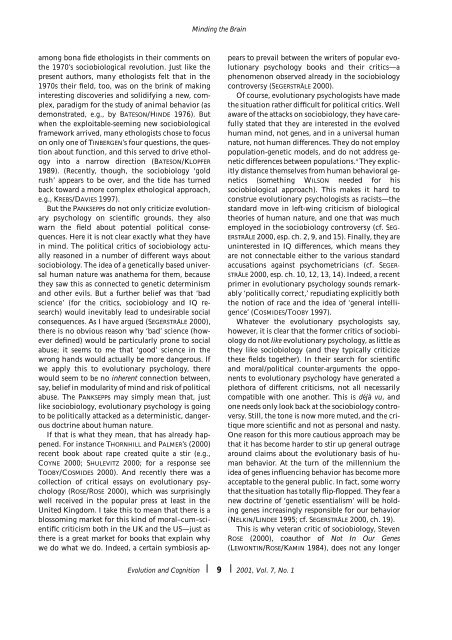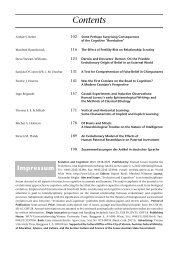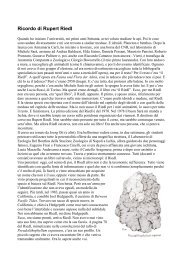The Seven Sins of Evolutionary Psychology - Konrad Lorenz Institute
The Seven Sins of Evolutionary Psychology - Konrad Lorenz Institute
The Seven Sins of Evolutionary Psychology - Konrad Lorenz Institute
You also want an ePaper? Increase the reach of your titles
YUMPU automatically turns print PDFs into web optimized ePapers that Google loves.
Minding the Brainamong bona fide ethologists in their comments onthe 1970’s sociobiological revolution. Just like thepresent authors, many ethologists felt that in the1970s their field, too, was on the brink <strong>of</strong> makinginteresting discoveries and solidifying a new, complex,paradigm for the study <strong>of</strong> animal behavior (asdemonstrated, e.g., by BATESON/HINDE 1976). Butwhen the exploitable-seeming new sociobiologicalframework arrived, many ethologists chose to focuson only one <strong>of</strong> TINBERGEN’s four questions, the questionabout function, and this served to drive ethologyinto a narrow direction (BATESON/KLOPFER1989). (Recently, though, the sociobiology ‘goldrush’ appears to be over, and the tide has turnedback toward a more complex ethological approach,e.g., KREBS/DAVIES 1997).But the PANKSEPPs do not only criticize evolutionarypsychology on scientific grounds, they alsowarn the field about potential political consequences.Here it is not clear exactly what they havein mind. <strong>The</strong> political critics <strong>of</strong> sociobiology actuallyreasoned in a number <strong>of</strong> different ways aboutsociobiology. <strong>The</strong> idea <strong>of</strong> a genetically based universalhuman nature was anathema for them, becausethey saw this as connected to genetic determinismand other evils. But a further belief was that ‘badscience’ (for the critics, sociobiology and IQ research)would inevitably lead to undesirable socialconsequences. As I have argued (SEGERSTRÅLE 2000),there is no obvious reason why ‘bad’ science (howeverdefined) would be particularly prone to socialabuse; it seems to me that ‘good’ science in thewrong hands would actually be more dangerous. Ifwe apply this to evolutionary psychology, therewould seem to be no inherent connection between,say, belief in modularity <strong>of</strong> mind and risk <strong>of</strong> politicalabuse. <strong>The</strong> PANKSEPPs may simply mean that, justlike sociobiology, evolutionary psychology is goingto be politically attacked as a deterministic, dangerousdoctrine about human nature.If that is what they mean, that has already happened.For instance THORNHILL and PALMER’s (2000)recent book about rape created quite a stir (e.g.,COYNE 2000; SHULEVITZ 2000; for a response seeTOOBY/COSMIDES 2000). And recently there was acollection <strong>of</strong> critical essays on evolutionary psychology(ROSE/ROSE 2000), which was surprisinglywell received in the popular press at least in theUnited Kingdom. I take this to mean that there is ablossoming market for this kind <strong>of</strong> moral–cum–scientificcriticism both in the UK and the US—just asthere is a great market for books that explain whywe do what we do. Indeed, a certain symbiosis appearsto prevail between the writers <strong>of</strong> popular evolutionarypsychology books and their critics—aphenomenon observed already in the sociobiologycontroversy (SEGERSTRÅLE 2000).Of course, evolutionary psychologists have madethe situation rather difficult for political critics. Wellaware <strong>of</strong> the attacks on sociobiology, they have carefullystated that they are interested in the evolvedhuman mind, not genes, and in a universal humannature, not human differences. <strong>The</strong>y do not employpopulation-genetic models, and do not address geneticdifferences between populations. 4 <strong>The</strong>y explicitlydistance themselves from human behavioral genetics(something WILSON needed for hissociobiological approach). This makes it hard toconstrue evolutionary psychologists as racists—thestandard move in left-wing criticism <strong>of</strong> biologicaltheories <strong>of</strong> human nature, and one that was muchemployed in the sociobiology controversy (cf. SEG-ERSTRÅLE 2000, esp. ch. 2, 9, and 15). Finally, they areuninterested in IQ differences, which means theyare not connectable either to the various standardaccusations against psychometricians (cf. SEGER-STRÅLE 2000, esp. ch. 10, 12, 13, 14). Indeed, a recentprimer in evolutionary psychology sounds remarkably‘politically correct,’ repudiating explicitly boththe notion <strong>of</strong> race and the idea <strong>of</strong> ‘general intelligence’(COSMIDES/TOOBY 1997).Whatever the evolutionary psychologists say,however, it is clear that the former critics <strong>of</strong> sociobiologydo not like evolutionary psychology, as little asthey like sociobiology (and they typically criticizethese fields together). In their search for scientificand moral/political counter-arguments the opponentsto evolutionary psychology have generated aplethora <strong>of</strong> different criticisms, not all necessarilycompatible with one another. This is déjà vu, andone needs only look back at the sociobiology controversy.Still, the tone is now more muted, and the critiquemore scientific and not as personal and nasty.One reason for this more cautious approach may bethat it has become harder to stir up general outragearound claims about the evolutionary basis <strong>of</strong> humanbehavior. At the turn <strong>of</strong> the millennium theidea <strong>of</strong> genes influencing behavior has become moreacceptable to the general public. In fact, some worrythat the situation has totally flip-flopped. <strong>The</strong>y fear anew doctrine <strong>of</strong> ‘genetic essentialism’ will be holdinggenes increasingly responsible for our behavior(NELKIN/LINDEE 1995; cf. SEGERSTRÅLE 2000, ch. 19).This is why veteran critic <strong>of</strong> sociobiology, StevenROSE (2000), coauthor <strong>of</strong> Not In Our Genes(LEWONTIN/ROSE/KAMIN 1984), does not any longerEvolution and Cognition ❘ 9 ❘ 2001, Vol. 7, No. 1








